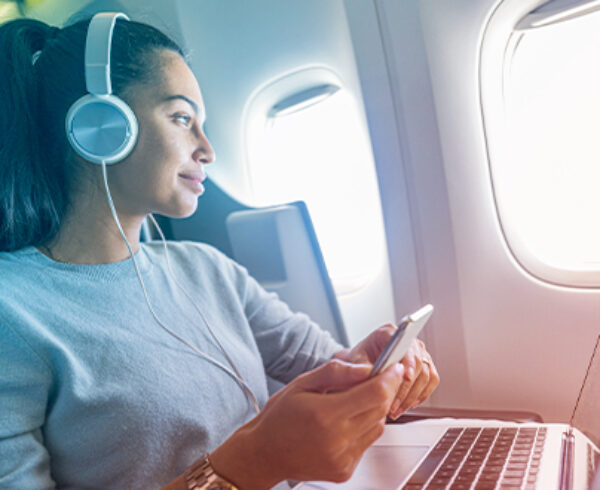Plenty of travel hacks aim to help you travel further, for cheaper — but many come with downsides. So what is skiplagging, and is it worth the risk?
Are you familiar with the travel influencer community on social media? If so, you’re likely well aware of just what lengths these individuals will go to, to travel more, get more views and likes, and overall build their online presence. Many are looking for ways to travel on the cheap. Then, they share their hacks and tips with armchair Travelers as they go.
A relatively recent travel hack that’s gained attention on social media (though which is by no means new to backpackers and similar avid budget travelers), is called skiplagging. Some influencers tout that it is an excellent way to make your travel budget go further while getting you where you need to go.
For some, it’s even a way to “get back” at an airline industry that can sometimes feel as if it hardly has the Traveler’s best interests at heart. If airlines’ only concern is making as much money as possible off bedraggled and weary Travelers, why not play the game, too? Why not get as much as you can from the airline for as little money as possible via skiplagging? Risk, of course!
So… what is skiplagging exactly? And is it really a good idea?

What is Skiplagging?
So, what is skiplagging? At its simplest, skiplagging is booking a flight with a layover. Then, you stay in the layover destination rather than traveling on to the flight’s final destination.
For example, let’s say you want to fly from Philadelphia to Charlotte. However, you notice that those direct flights are either unavailable, sold out or out of your budget. However, you also notice that there’s a flight from Philadelphia to Los Angeles with a layover in Charlotte. It just so happens to be on sale, with plenty of seats available. You book the Los Angeles flight but don’t actually go to Los Angeles. Instead, you get off the first flight in Charlotte. Then you stay there, never getting on the flight to Los Angeles.
Of course, skiplagging does require that you only pack a carry-on. You have no way to get your checked luggage in Charlotte otherwise. However, for many, it seems like a convenient way to travel and it’s not technically dishonest. You’re paying the airline for the entire flight. Why should they care if you get off the plane early?
Some even argue that airlines have brought the new trend of skiplagging on themselves, through practices like dynamic pricing. This pricing can sometimes raise the price of your airfare based on factors like whether you were willing and able to pay a higher price the last time you booked a flight.
There’s even an entire booking platform based around skiplagging, called Skiplagged, which helps Travelers find skiplagging opportunities. (United Airlines attempted to sue — and failed — Skiplagged for lost revenue, saying that the site promoted “strictly prohibited” travel.)
All of the above considered, you might think that skiplagging is worth a try during your next trip. However, there are a few reasons why you should think twice before engaging in this risky practice.

Why is Skiplagging Bad?
There are a few reasons why skiplagging can be risky. Here’s why you should think twice about skiplagging before giving it a try.
You could face repercussions from the airline.
Of course, airlines don’t like it when you work around their airfares and get where you want to go, on the cheap, so airlines are cracking down on skiplagging.
Last year, American Airlines banned a skiplagging Traveler for three years. The Traveler purchased a ticket from Florida to New York City, with a layover in Charlotte. The Traveler intended to remain in Charlotte rather than fly all the way to New York. As a business traveler, could you imagine being banned from an airline?
American Airlines is not new to the skiplagging game. In 2021, it released a memo to travel agents, noting that it would begin taking measures to prevent skiplagging.
Often, in cases of airlines issuing repercussions for skiplagging, they cite a violation of their terms of service or the purchase contract. For example, in 2019, Lufthansa similarly attempted to sue a passenger for skiplagging. The airline noted that skiplagging violated the airline’s terms of service. Southwest Airlines also has a mention in its ToS that prohibits skiplagging.
So, while skiplagging is technically not illegal, it can put you in hot water with an airline, not to mention your employer. If you’re banned from an airline or you’re on a business trip and sued for skiplagging, you could find your skiplagging to not be worth the money you saved. You can also lose your frequent flyer status, as well as any accrued points or miles.
Skiplagging makes duty of care difficult.
Your employer has a responsibility to ensure your safety while you’re traveling for work. Skiplagging, however, can make it difficult for them to fulfill this responsibility. Particularly if you work on a large team with multiple business Travelers, and if perhaps your employer works with a Travel Management Company to oversee duty of care, skiplagging complicates matters.
On paper, if we’re using the same example from above, you’re traveling to Los Angeles, not Charlotte. If there’s a crisis in one city and not the other, how can your employer ensure your safety? Especially if it’s unclear where exactly you are at any given time?
Not only can this confuse duty of care responsibilities, but it can also wreak havoc on data and analysis down the line. As travel budgets are laid out and strategies are put into place to ensure profitable business travel and better business travel for all employees, that data says you went to Los Angeles, not Charlotte. In the end, it not only makes duty of care more difficult but more costly, too.
Skiplagging: It’s Not Worth the Risk
Ultimately, while skiplagging may seem like a clever idea on the surface, it comes with far too many risks to both your safety and your ability to travel for work. If you can’t freely travel with certain airlines due to past offenses, or your employer is not able to provide duty of care, you likely can’t perform your job appropriately, and your personal and physical safety is at risk.
Keep up to date on similar travel trends and what you need to know about them as a business Traveler. Follow the JTB Business Travel blog for more.













